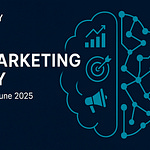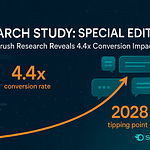This weekend marked a turning point in digital marketing strategy. Duolingo's radical social media blackout following their AI-first backlash demonstrates how brands can weaponise silence, while Google's I/O announcements cement AI's dominance in search. Fresh data reveals that whilst 78% of organisations now use AI, most still haven't cracked the ROI code.
Story #1: Duolingo's Social Media Blackout — The Power of Strategic Silence
Source: Adweek, Fast Company (published May 20-21, 2025)
URL: https://www.adweek.com/brand-marketing/duolingo-experimenting-with-silence-amid-social-media-blackout/
What Happened: Since Saturday, 17th May, Duolingo completely scrubbed its Instagram and TikTok accounts, leaving only cryptic messages like "gonefornow123" and dead roses emojis. This followed massive backlash over their AI-first strategy announcement that's replacing human contractors with AI. When reached for comment, a Duolingo spokesperson told ADWEEK, "Let's just say we're experimenting with silence. Sometimes, the best way to make noise is to disappear first."
Why It Matters: This isn't crisis management, it's strategic disruption. The company had executed its most successful social media campaign ever with Duo's "death" by Cybertruck, generating over a billion organic views. Now they're proving that silence can be just as viral as content when used tactically.
Suggested Actions:
Audit your crisis communications strategy — consider how controlled silence could serve as a strategic asset rather than reactive damage control
Develop protocols for turning controversy into engagement opportunities whilst maintaining brand authenticity
Story #2: Google I/O 2025 — AI Mode and the Search Revolution Accelerates
Source: Google Blog (published May 21, 2025)
URL: https://blog.google/products/search/google-search-ai-mode-update/
What Happened: Google's AI Overviews have scaled to over 1.5 billion users in 200 countries and territories, driving over 10% growth in query types that show them in major markets like the US and India. The new AI Mode provides deeper reasoning and conversational abilities, with early testers asking queries two to three times longer than traditional searches.
Why It Matters: During Google's March 2025 core update, AI Overviews spiked by 528% for entertainment queries, 387% for restaurant queries, and 381% for travel queries. We're witnessing the fundamental restructuring of how search results are presented, with traditional organic rankings becoming secondary to AI-generated responses.
Suggested Actions:
Optimise content for AI Overview inclusion by focusing on comprehensive, authoritative answers rather than keyword density
Test query patterns that trigger AI Mode to understand how your audience's search behaviour is evolving
Story #3: The AI Marketing Reality Check — What the Latest Data Actually Shows
Source: McKinsey, SurveyMonkey, SEO.com (published March-May 2025)
URL: https://www.mckinsey.com/capabilities/quantumblack/our-insights/the-state-of-ai
What Happened: 78% of organisations now use AI in at least one business function, up from 55% a year earlier, with marketing and sales being the most common applications. However, despite the AI marketing market being valued at $47.32 billion in 2025, only 1% of executives describe their gen AI rollouts as "mature." 88% of marketers use AI in day-to-day roles, but automation ranks only fourth in popular use cases.
Why It Matters: There's a massive gap between AI adoption and AI mastery. 40% of marketers indicated uncertainty about whether AI-powered solutions were implemented in their workplace, whilst 35% stated their organisations hadn't implemented AI tools at all. This suggests individual tactical use rather than strategic organisational implementation.
Suggested Actions:
Move beyond individual AI tool usage to develop organisation-wide AI strategies with clearly defined KPIs
Focus on measuring actual ROI rather than just efficiency gains from AI implementation
Story #4: Google's March Algorithm Update Aftermath — The Dust Settles
Source: Search Engine Land (published March-May 2025)
URL: https://searchengineland.com/google-march-2025-core-update-rollout-is-now-complete-453364
What Happened: Google's March 2025 core update is now complete after a 14-day rollout, causing significant ranking volatility especially in health and finance sectors. Many website owners reported sharp declines, with some losing 70% of traffic within 24 hours, whilst others saw unusual SERP changes like only 6 results appearing instead of the usual 10.
Why It Matters: This update seemed to favour non-SEO sites with outdated design and no meta descriptions, confusing many industry professionals. It represents Google's continued push towards rewarding authentic, user-focused content over traditional SEO optimisation tactics.
Suggested Actions:
Review your content strategy through the lens of user value rather than search engine manipulation
Use Google Search Console as your primary diagnostic tool rather than relying on third-party tracking tools that may misrepresent the update's impact
Comprehensive Analysis: The Weekend That Changed Everything
This weekend's developments reveal three critical shifts reshaping digital marketing. First, Duolingo's blackout demonstrates that in an attention economy, strategic silence can be more powerful than constant content creation. Their social team operates with significant autonomy and a streamlined approval process, allowing them to execute campaigns in just six days rather than waiting months. This agility is becoming essential as consumer attention spans shrink and viral moments become increasingly unpredictable.
Second, Google's AI Mode rollout represents the most significant change to search since the introduction of Knowledge Panels. With Elo scores up more than 300 points since first-generation Gemini Pro and Gemini 2.5 Pro sweeping the LMArena leaderboard, Google is reasserting dominance in the AI space. For marketers, this means traditional SEO strategies focused on ranking positions are becoming obsolete. The future belongs to those who can create content that feeds AI systems whilst maintaining human authenticity.
Third, the data gap between AI adoption and AI effectiveness is widening. Over 37% of marketing teams have embraced AI as a core part of their strategy according to Statista, but most organisations still lack the infrastructure to capture meaningful value. One software executive estimated that the output of a single software engineer has already risen by 10 times or more due to AI assistance. Marketing teams that focus on measuring tangible business outcomes rather than just operational efficiency will separate themselves from the pack.
The March algorithm update's aftermath serves as a reminder that Google's evolution is relentless and often unpredictable. The update appeared to favour authenticity over optimisation, with some non-SEO sites outranking heavily optimised competitors. This suggests that Google's AI systems are becoming increasingly sophisticated at detecting and penalising content created primarily for search engines rather than users.
Looking ahead, successful marketers will need to master three key competencies: the ability to create authentic, AI-friendly content; the agility to execute rapid campaign pivots when opportunities arise; and the analytical skills to measure AI's true impact on business outcomes rather than just operational metrics.
Key Takeaways
Strategic silence can amplify brand attention — Duolingo proved that disappearing can generate more engagement than constant content creation
AI search is fundamentally restructuring organic discovery — Traditional ranking optimisation is giving way to AI Overview inclusion strategies
Most organisations are using AI tactically, not strategically — The gap between adoption and measurable ROI continues to widen
Algorithm updates increasingly favour authenticity over optimisation — Google's systems are getting better at detecting content created for search engines rather than users
How-To Spotlight: Optimising for Google's AI Mode in 2025
The shift to AI-powered search requires a fundamental change in content strategy. Here's how to adapt:
Map Your Content to AI Query Patterns: Early AI Mode testers are asking queries two to three times longer than traditional searches, with follow-up questions becoming common. Create comprehensive content that anticipates and answers related questions within the same piece.
Focus on Conversational Authority: AI systems favour content that demonstrates expertise through natural language rather than keyword stuffing. Write as if you're having an in-depth conversation with a knowledgeable colleague.
Structure for AI Parsing: Use clear headings, bullet points, and logical flow that AI systems can easily understand and excerpt. Think about how your content would sound if read aloud by an AI assistant.
Monitor AI Overview Inclusion: Track which of your content appears in AI Overviews and identify patterns in topics, format, and depth that trigger inclusion.
FREE BETA ACCESS: We've launched our AI for SEO course to help you implement these cutting-edge strategies. Get free access during the beta period at https://seoaicourse.indexify.co/
COMING SOON: We're also developing a more advanced course for marketers who want to take their AI skills to the next level. Check out our LinkedIn announcement for early details.
Subscribe to our daily updates: https://indexify.substack.com/ and listen to our podcast: https://indexify.substack.com/podcast














Share this post